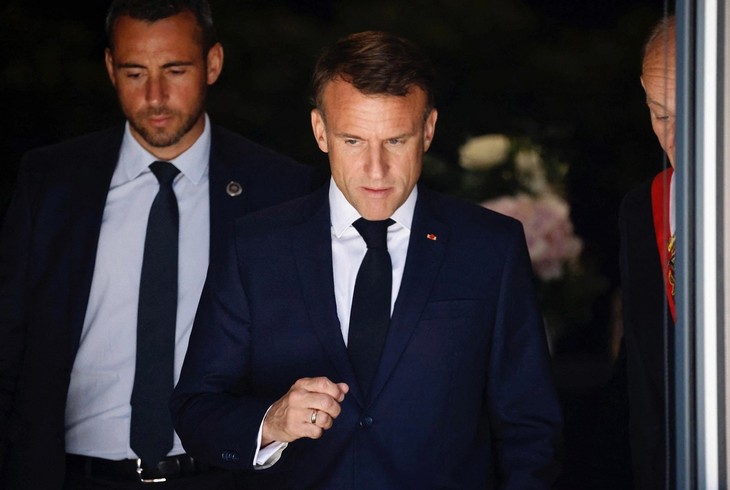(VOVWORLD) - The European Parliament elections this year saw gains by rightwing parties, including strong gains by far-right parties. This could have a drastic impact on important policies and change the balance of power in many member states.
 French President Emmanuel Macron votes at the European Parliament elections on June 9, 2024. (Photo: AFP) French President Emmanuel Macron votes at the European Parliament elections on June 9, 2024. (Photo: AFP) |
More than 51% of 360 million voters in 27 EU countries cast ballots in the European Parliament elections for the 2024-2029 term, the highest rate in the past 20 years.
Advances by rightwing parties
Preliminary results announced on Tuesday showed that, with 186 seats, the European People's Party (EPP) is still the strongest political force in the EP. Altogether, rightwing parties, including the Social and Democratic Alliance (S&D) and Renew Europe (RE) won 400 of 720 seats, surpassing the majority needed to play the leading role in the EP and have an advantage in the election of the next European Commission President. The Green Party, which gained strongly in the 2019 elections, saw a significant decline this year, winning only 53 seats, 19 seats fewer than in the previous term.
This year's gain by far-right parties was particularly significant in France and Germany, the two leading powers in the EU.
France’s National Rally party won 31.5% of the vote according to exit polls on Sunday, twice the 15.1% won by the Renaissance party of President Emmanuel Macron. Germany’s far-right Alternative for Germany (AfD) won 16% of the vote, ranking 2nd and surpassing all three parties in the coalition government of Chancellor Olaf Scholz.
In Austria, Spain, Italy, Belgium, and the Netherlands, far-right parties also had significant gains compared to the elections five years ago.
Although the rise of the right wing, particularly far-right and populist parties, was predicted, the election result was still a shock and the new power balance in the EP will affect many EU policies.
Corina Stratulat, an expert with the European Policy Center, said: “Environment, I think remains vulnerable. But also, of course, given how the Parliament looks at the moment, I think there are also a number of other areas, including anything linked to institutional reform, to enlargement, even defense that could be at risk as well.”
Many experts share her view that strong polarization and the rise of the far right will push the majority coalition (EPP, RE, S&D) to rely more on the far right to pass important reforms.
Armida van Rij, an expert with Chatham House, says that the greater role of far-right parties will negatively impact Europe's immigration policy, forcing the EC to abandon or delay some recently passed reforms such as border security control and a refugee temporary relocation mechanism.
The EU's Green Pact is also likely to be affected, as the EP may delay the adoption of important climate agreements and ease many environmental protection regulations in agriculture, as it did last April to handle a wave of farmer protests across Europe.
Banning the sale of petrol and diesel cars in Europe after 2035 may also be canceled, while investment in renewable energy may be overwhelmed by investment in cheaper fuels, such as offshore petroleum and nuclear energy.
Regarding security and defense, many far-right parties in Europe have always opposed increasing the defense budget, so the election result could hinder the building of the European Defense Fund or continuing support for Ukraine.
A shock from France
The EP elections will also have a strong impact on many countries’ internal politics, notably France. On the evening of June 9, upon receiving the news of the RN party's victory, French President Emmanuel Macron decided to dissolve France’s Parliament and hold early elections on June 30 and July 7.
This will be the first time in 27 years that France’s Parliament has been dissolved for early elections. President Macron explained that the French people should be given the right to choose again, and said he believes in the wisdom of French voters to prevent the far-right party RN from taking power.
Many observers say, however, that Macron is gambling and RN actually has a good chance of winning.
Anne Muxel, Research Director at the French National Center for Scientific Research, said: “It opens the volatility and uncertainty in the next three weeks before the elections. It could lead to a far-right political party coming into power in the French government for the first time.”
If the RN party wins a majority in the French Parliament elections, President Macron will have little choice but to let the RN party form a new government.
In Belgium, after being defeated in the EP elections and federal elections which were held simultaneously, Prime Minister Alexander De Croo resigned on June 10.
German Chancellor Olaf Scholz said he will not hold early elections, but experts say losses by the three parties in the ruling coalition – the Social Democratic Party, the Green Party, and the Democratic Party – will weaken the ruling coalition’s governance.